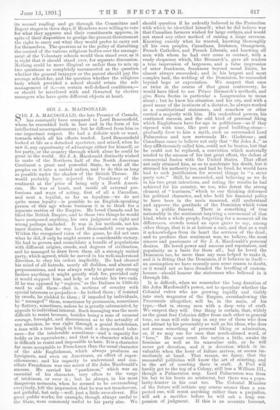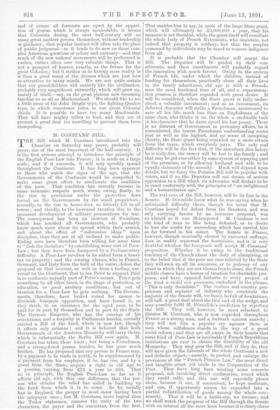SIR J. A. MACDONALD.
SIR J. A. MACDONALD, the late Premier of Canada, has constantly been compared to Lord Beaconsfield, whom he resembled both in face and in the form of his intellectual unscrupulousness ; but he differed from him in one important respect. He had a definite wish or want, towards which all his efforts tended. Lord Beaconsfield looked at life as a detached spectator, and seized, when he saw it, any opportunity of advanta go either for himself, or his party, or the country through which alone he could be great in the world. Sir J. A. Macdonald distinctly wished to make of the Northern half of the North American Continent a great and powerful State, to weld all the peoples on it into a united nation, and to do this as long as possible under the shadow of the British Throne. He would probably have rejected the Presidency of the continent at the ` price of being only a North Ameri- can. He was at heart, and inside all external pro- fessions and ways of acting, first of all a Canadian, and next a loyalist, so far as loyalism—we do not quite mean loyalty—is possible to an English-speaking person of this age whose business it is to think for a separate section of the Empire. He loved Canada and he liked the British Empire, and to those two things he would have postponed anything, his own judgment on right and wrong perhaps included. It was in ,his methods, not his inner desires, that he was Lord Beaconsfield over again. Within the recognised rules of the game, he did not care what he did, if only he might secure a considerable victory. He had to govern and consolidate a bundle of populations with different origins, creeds, and degrees of civilisation, and he managed to draw from them all a strongly united party, which agreed, while he moved in his well-understood direction, to obey his orders implicitly. He had cleared his mind of all hatreds, nearly all dislikes, and almost all prepossessions, and was always ready to grant any strong faction anything it might greatly wish for, provided only it would support him, and help or tolerate his two ends. If he was opposed by" regions," as the Italians in 1860-65 used to call them—that is, sections of country with special interests or prejudices—he bribed them ; if resisted s by creeds, he yielded to them ; if impeded by individuals, he " managed ' them, sometimes by persuasion, sometimes by flattery, sometimes, unless he is greatly calumniated, by appeals to individual interest. Such managing was the more difficult to resist because, besides being a man of unusual courage, foresight, and discernment as to the actuality of any situation, he was right through a genial Scotchnsan, a man with a true laugh in him, and a deep-rooted toler- ance—for the intolerable sometimes—and a capacity for toddy,or its equivalents ; and that is a character which it is difficult to resist and impossible to hate. It is a character far more acceptable to Frenchmen than the usual character of the able Englishman, which always produces on foreigners, and even on Americans, an effect of super- ciliousness; and his capacity to understand and con- ciliate Frenchmen was one secret of Sir John Macdonald's success. He carried his "pawkiness," which was an essential of his character, very often to the verge of trickiness, or over it ; but he always, in his most dangerous moments, when he seemed to be overreaching everybody, left the impression that he was not treacherous, not guileful, but only—well, just a little over-clever. His great public works, for example, though always useful to the State, were commonly useful to his party also. We should question if he ardently believed in the Protection with which he identified himself ; what he did believe was that Canadian farmers wished for large outlays, and would not stand any other method of raising a large revenue. Knowing exactly what he wanted, knowing thoroughly all his own peoples, Canadians, Irishmen, Orangemen, French Catholics, and French Liberals, and knowing all men with whom he had ever come in contact, with a ready eloquence which, like Bismarck's, gave all readers a true impression of largeness, and a false impression of utter frankness, frankness beyond usual limits, he almost always succeeded; and in his largest and most complex task, the welding of the Dominion, he succeeded beyond hope or expectation. We suspect that once or twice in the course of that great controversy, he would have liked to use Prince Bismarck's methods, and give Nova Scotia in particular a Langensalza to moan about ; but he knew his situation and his era, and with a good many of the instincts of a dictator, he always worked as a constitutional statesman, and somehow or other carried a majority with him. His undoubted powers, his continued success, and the odd kind of personal liking which Englishmen have for age in politicians—as if they ripened with time, like port or good building-stone- gradually drew to him a myth, such as surrounded Lord Palmerston and now surrounds Mr. Gladstone ; and Canadians came to believe not only that "Sir John A.," as they affictionately called him, could not be beaten, but that he could not be replaced, a conviction which materially tended to the success of his last great effort, the defeat of commercial fusion with the United States. That effort not only strained him, so as to accelerate his death, but it strained his authority too, and had he lived, he would have had to seek justification for several things in "a strict party vote." Still, he succeeded, and believing as we do in his two great intentions, and noting the results he had achieved for his country, we too, who detest the strong element of "leanness," which to our thinking deformed his political character, and who hold his financial policy to have been in the main unsound, still understand and approve the gratitude of the Dominion which votes him a public funeral. There is something of true nationality in the sentiment inspiring a ceremonial of that kind, when a whole people, forgetting for a moment all its differences, crowds round an open grave to say, among other things, that it is at bottom a unit, and that as a unit it acknowledges from its heart the services of the dead ; and to produce that sentiment was, we believe, the most sincere and passionate of Sir J. A. Macdonald's personal desires. He loved power and success and reputation, and popularity as a basis for them all ; but he loved the Dominion too, he more than any man helped to make it, and it is fitting that the Dominion, if it believes in itself— an assumption we have recently seen some reason to doubt, or it would not so have dreaded the levelling of custom- houses—should honour the statesman who believed in it through life.
It is difficult, when we remember the long duration of Sir John Macdonald's power, not to speculate whether the Colonial rulers who are growing rapidly -and visibly into such magnates of the Empire, overshadowing the Proconsuls altogether, will be, in the main, of his type,—that is, strong men with a deep vein of craft. We suspect they will. One thing is certain, that, widely as the great free Colonies differ from each other in general tone, no man will rule long in any one of them who does not attract by his personality as well as his ideas, who does not rouse something of personal liking or admiration, or, if we may use for once that much-abused word, of "love." Ile must court the nation a little, awake its feminine as well as its masculine side, or he will never get devotion, and it is devotion which is in- valuable when the hour of failure arrives, or seems im- mediately at hand. That means, we fancy, that the successful politician will know the art of courting, and in the art of courting there is craft. A Peel will hardly get to the top of a Colony, still less a William III, though a Palmerston may. Lord Palmerston was from his hat to his boots an aristocrat, but there was a popu- larity-hunter in his coat too. The Colonial Minister of the future will initiate any course sooner than a sus- pected one, will resist anything rather than a prejudice, will ask a sacrifice before he will ask a long sus- pension of judgment. If this is an accurate forecast, and of course all forecasts are upset by the appari- tion of genius which is always incalculable, it means that Colonists during the next half-century will on many great matters govern themselves, without leadership or guidance; that popular instinct will often take the place of public judgment—as it tends to do now on those com- plex American questions of colour and currency—and that much of the new nations' movements will be performed in rushes, rushes often over very valuable things. That is not a prospect of heaven exactly, as the future for the great Colonies ; but it strikes us as having more reality in it than a good many of the dreams which are just now so attractive to many minds. We are not quite certain that our grandchildren will entirely like the civilisation, probably very magnificent outwardly, which will grow up, mainly of itself,—say, on the great plateau now becoming familiar to us all as Mashonalancl. We should like to see a little more of the John Bright type, the fighting-Quaker type, in which conscience rules, in our great Colonial chiefs. It is possible to have too many Macdonalds. They will have mighty tribes to lead, and they are at present a great deal too unwilling to prevent them from stampeding.



































 Previous page
Previous page